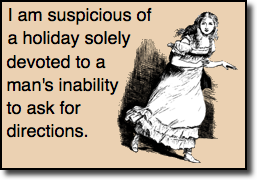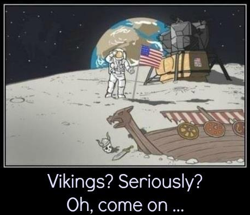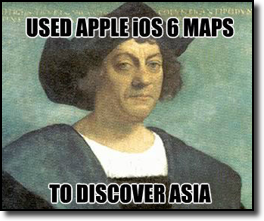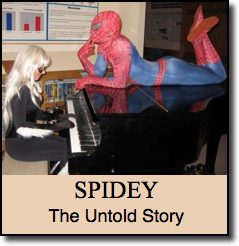 The U.S. should have a national holiday in my honor. On several occasions I have led a large group of cyclists over long distances, become lost, and then tried to convince the others that I was right where I expected to be. I am the Christopher Columbus of bicycling.
The U.S. should have a national holiday in my honor. On several occasions I have led a large group of cyclists over long distances, become lost, and then tried to convince the others that I was right where I expected to be. I am the Christopher Columbus of bicycling.
The United States celebrated a national holiday this past week that honored Christopher Columbus. By honored, I mean we pretty much ignored the holiday.
Many of us older folks were taught that Columbus discovered North America in 1492. The fact that millions of people were already living in North America didn’t diminish his legacy. Neither did the fact that Columbus landed in Bermuda thinking it was India, saw Cuba and thought it was China, and made a trip to Hispaniola convinced it was Japan. He had no clue that there was a giant landmass and another ocean between Spain and Asia.
 Why do we celebrate such a confused man? Because, in our hearts we need a hero. When a hero doesn’t exist to fit an occasion, we create one. The legend of Columbus was that creation. Sure, we believed the story at first, but even after learning more details, we continued to teach and believe in his accomplishments. We ignored his barbaric treatment of native islanders as a necessary evil of conquest because it didn’t make for a great story. To this day we have a national holiday in his honor.
Why do we celebrate such a confused man? Because, in our hearts we need a hero. When a hero doesn’t exist to fit an occasion, we create one. The legend of Columbus was that creation. Sure, we believed the story at first, but even after learning more details, we continued to teach and believe in his accomplishments. We ignored his barbaric treatment of native islanders as a necessary evil of conquest because it didn’t make for a great story. To this day we have a national holiday in his honor.
We give the similar to great innovators. We love the notion of a lone wolf inventor who stole brilliance from the gods and changed the world forever. Because we have an attention span one second less than a goldfish’s, we stay at the surface of the story. We don’t search for the real story – and this tendency is dangerous to young innovators everywhere.
 Christopher Columbus had a lot in common with some great inventors like Tesla, Edison, and Jobs. For one, Columbus wasn’t the first to accomplish what was credited to him. Millions of people already inhabited North America when he arrived. Tesla didn’t invent alternating current. Such devices were on the market before Tesla was born. Tesla improved AC to make it more practical. I contend that improving on current thinking is exactly what Steve Jobs did with the vast majority of his ideas. As Mark Twain said, “…ninety-nine parts of all things that proceed from the intellect are plagiarisms, pure and simple; and the lesson ought to make us modest.”
Christopher Columbus had a lot in common with some great inventors like Tesla, Edison, and Jobs. For one, Columbus wasn’t the first to accomplish what was credited to him. Millions of people already inhabited North America when he arrived. Tesla didn’t invent alternating current. Such devices were on the market before Tesla was born. Tesla improved AC to make it more practical. I contend that improving on current thinking is exactly what Steve Jobs did with the vast majority of his ideas. As Mark Twain said, “…ninety-nine parts of all things that proceed from the intellect are plagiarisms, pure and simple; and the lesson ought to make us modest.”
Christopher Columbus was not a nice guy. He was an egoist who was ashamed of his parents’ blue-collar background. He was a slave-trader despite the fact that Spain, his financier, had outlawed the practice. He was said to have been responsible for the genocide of the indigenous people of the islands he “discovered.” Thomas Edison sacrificed pets to discredit Tesla’s alternating current inventions by demonstrating the dangers. While not as horrific as Columbus or Edison, being around Steve Jobs was no walk in the park either. Stories abound illustrating how badly he treated others.
 None of this seems to matter because we need a hero. We need a name and a face to attribute to the great stories. The ancient Greeks created heroes, as have all civilizations. The presence of a hero leads us to believe that great innovations are often the result of one really smart, ambitious person. We overlook how many other shoulders we have to stand on just to see a distant horizon, let alone reach it. The belief in a lone wolf teaches us to focus on creating the new by isolating ourselves rather than embracing the genius of a team.
None of this seems to matter because we need a hero. We need a name and a face to attribute to the great stories. The ancient Greeks created heroes, as have all civilizations. The presence of a hero leads us to believe that great innovations are often the result of one really smart, ambitious person. We overlook how many other shoulders we have to stand on just to see a distant horizon, let alone reach it. The belief in a lone wolf teaches us to focus on creating the new by isolating ourselves rather than embracing the genius of a team.
If we knew the real stories of the great inventors, would we be less inspired to accomplish great things? Transparency gives us hope that we, with all of our shortcomings, can become great as well. Reality can empower greatness by teaching us that life is often a series of cool accidents stitched together to form something new. It teaches us how important resilience is to survival.
Most of all, reality teaches us that we don’t have to spin every story into a tightly knit, consumable package. There is more to be learned from the truth than there is in legend.






